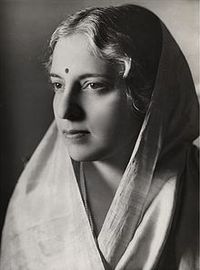The Best Advice I Ever Had
Introduction
About the Writer
Vijaya Lakshmi Nehru Pandit (18 August 1900 – 1 December 1990) was an Indian diplomat and politician, the sister of Jawaharlal Nehru, the aunt of Indira Gandhi and the grand-aunt of Rajiv Gandhi, each of whom served as Prime Minister of India.She was an active Indian nationalist and was imprisoned three times by the British authorities in India. With Indian independence, Pandit entered on a distinguished diplomatic career, leading the Indian delegation to the UN, serving as India's ambassador to Moscow, Washington and Mexico, and becoming the first woman to become president of the UN General Assembly.
Text of the Prose
To access the text of the prose, click here
Summary of the Text
Most people pass through a period of anguish when their belief in humanity is at low ebb. I was in such a period. My husband had recently died. My deep sorrow over his loss was followed by the humiliating realization that in the eyes of the Indian law I had no individual existence. Along with other Indian women I had participated for years with men in national struggle for freedom, working and suffering side by side with them until it had finally been achieved-yet in the law we women were still recognized only through our relationship to men.
Now as a widow without a son, I was not entitled to any share of the family property, nor were my two daughters. I resented this galling position.
I was bitter towards those members of my family who supports this antiquated law.
At this time I went to pay my respects to Gandhiji and say good-bye before leaving for America to take part in a conference. After our talk he asked, "Have you made peace with your relatives?" I was amazed that he would take sides against me." I have not quarreled with anyone," I replied," but I refuse to have anything to do with those who take advantage of an outworn law to create difficult and humiliating situation for me."
Gandhiji looked out of the window for a moment. Then he turned to me and smiled and said, "You will go and say good-bye because courtesy and decency demand this. In India , we still attach importance to these things."
"No," I declared, "not even to please you will I go to those who wish to harm me."
"No one can harm you except yourself." he said, still smiling. "I see enough bitterness in your heart to cause you injury unless you check it."
I remained silent, and he continued: "You are going to a new country because you are unhappy and want to escape. Can you escape from yourself? Will you find happiness outside when there is bitterness in your heart? Think it over. Be a little humble. You have lost a loved one. Must you inflict further injury on yourself because you lack courage to cleanse your own heart?"
His words would not leave me. They gave me no peaceAfter some days of severe struggle with myself, I finally telephoned my brother-in-law.I would like to see him and the family,I said, before leaving.
I hadn't been with them for five minutes before I sensed that my visit had brought a feeling of relief to everyone. I told them my plans and asked for their good wishes before starting on his new stage of my life. The effect on me was miraculous. I felt as If A great burden had been lifted and I was free to be myself.
This small gesture was the beginning of a significant change in me. A year and half later I was in New York , leader of the Indian delegation to the United Nations. Important to us was India 's delegation to the UN> Important to us was India 's complaint regarding the treatment of people of Indian origin in South Africa . Harsh things were said by both the sides. I resented the manner in which my opponents made personal attacks harmful to India 's prestige and to mine. I struck back with the same sharp weapons.
Then, after distressing duel of words, I suddenly thought of Gandhiji.
Would he approve? To him, means were as important as the end-in the long run, perhaps more important. What if we succeeded in getting our resolution passed by questionable tactics that injured our self-respect?
Before going to bed that night I resolved that, come what might, no word of mine would be lightly used in the UN. From then on, I lifted the debate back to where it belonged, refusing to retaliate to personal attack or to score a cheap point. Our opponents met us on the new level and from then on we argued the case on its merit.
Before leaving the committee room on the last day, I went up and spoke to the leader of the opposing delegation. "I have come to ask you to forgive me if I have hurt you by any word or action in this debate."
He shook my hand warmly and said, "I have no complaint."
It was good to feel right within him but even better to feel right within myself. Once more, Gandhiji's advice helped me from myself.
Language skills
Vocabulary
Grammar usage
Additional Resources
Pandit's own writings include So I Became a Minister (1939); Prison Days (1946); a touching essay, "The Family Bond", A Study of Nehru (1959); many interviews and articles, and innumerable published speeches. Her daughter, Nayantara (Pandit) Sahgal, presented revealing portraits in Prison and Chocolate Cake (1954) and From Fear Set Free (1963).
There is no good biography of Pandit, but three books by professed admirers are interesting: Anne Guthrie Madame Ambassador: The Life of Vijaya Lakshmi Pandit (1962); Vera Brittain Envoy Extraordinary (1965); and Robert Hardy Andrews A Lamp for India: The Story of Madame Pandit (1967).
